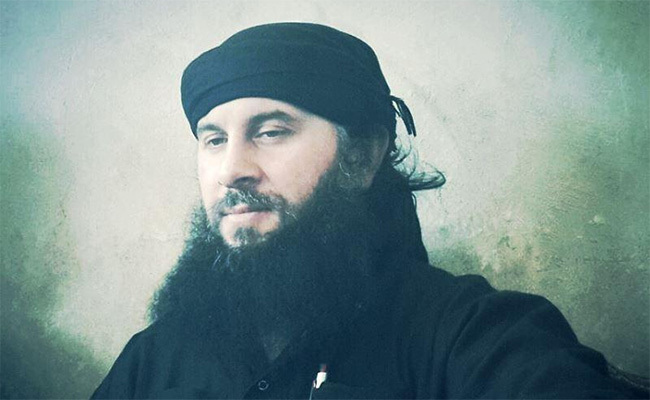
Chechen Ousted as Amir of Jaish al-Muhadjireen wal-Ansar Rebel Group in Syria
Publication: Eurasia Daily Monitor Volume: 12 Issue: 129
By:

In April, a sharia court decreed that a range of orders issued by Amir Salakhuddin Shishani (Feyzulla Margoshvili), the long-time leader of the Jaish al-Muhadjireen wal-Ansar (JMA), were in breach of sharia norms. JMA is an insurgent group fighting the Syrian regime made up mainly of Chechen and other North Caucasian members. Military amir Abdul Karim Krymskiy was discharged along with Salakhuddin Shishani (Newsmirislamic.wordpress.com, June 10). Thus, this once powerful group of North Caucasians in Syria appears to be now entering a period of decline. Amir Salakhuddin Shishani is likely to try to establish another group in the northern part of Aleppo and near the Turkish border. Amir Abu Ibrahim Khurasani has replaced Shishani as JMA leader and Umar Dagestani has replaced Krymskiy as the group’s military amir.
The formal pretext for the move is that Krymskiy refused to obey an order by Mugtasim, the Saudi head of the JMA’s sharia committee, to relinquish a palace Krymskiy had captured. Mugtasim joined the JMA a year earlier after many of its members quit the group and joined the Islamic State (IS). According to various estimates, anywhere from 500 to 800 North Caucasians left the JMA to join IS, leaving an estimated 60 to 100 North Caucasians and a few dozen Central Asians under the command of Amir Salakhuddin Shishani. Hundreds of Arabs, primarily from Saudi Arabia, Syria and Libya, replenished the ranks of the JMA. This increased the influence of the Arabs, who saw that even though the North Caucasians were good fighters, their knowledge of Islamic theology and sharia was quite poor. Thus, the transition of power to the Arabs in the group was only a matter of time (Justpaste.it, June 2015).
Supporters of IS welcomed the decision of the sharia court on their websites and accused Amir Salakhuddin Shishani and Amir Abdul Karim Krymskiy of neglecting sharia laws (Infochechen.com, June 11). However, the website close to the discharged amirs called their removal a coup that would also weaken the positions of the Caucasus Emirate (CE) in Syria and in the North Caucasus (Kavkazcenter.com, June 24). Bearing in mind that Kavkazcenter is managed by Movladi Udugov, the website’s involvement in the fight can also be understood from a different angle. The sharia court that sacked Amir Salakhuddin Shishani emphasized the negative role of Abu Ali Shishani (Isa Umarov), who is the half brother of Movladi Udugov on his mother’s side. The sharia commission decreed punishing Abu Ali Shishani with expulsion from the militant group and, if he repeats the offense, expulsion from the land of Sham (Syria). Abu Ali Shishani permitted forbidden types of bloodshed both in Syria and elsewhere, and justified his actions on religious grounds. The sharia court determined Abu Ali Shishani’s actions to be criminal and noted he had indulged in such actions on more than one occasion. It should be noted that Isa Umarov was Doku Umarov’s adviser at the time the Caucasus Emirate was proclaimed, replacing the ideology of the independent Republic of Ichkeria with the ideology of establishing an Islamic state in the North Caucasus. Isa Umarov had earlier been rejected by his father-in-law Umar Shishani (Tarkhan Batirashvili), the well-known IS military amir. Umarov later had a legal battle with another important Chechen insurgent leader—Amir Muslim (Muslim Margoshvili), who led the Jund al-Sham group. A sharia court found Umarov guilty in that legal battle as well. It appears that Isa Umarov will, in the near future, be forced to leave Syria and return to Turkey.
Despite the removal of Amir Salakhuddin Shishani, his few remaining supporters have launched a campaign in his defense. The well-known Syrian Muslim scholar Abdul-Razak al-Mahdi defended Salakhuddin Shishani, accusing Mugtasim, the Saudi head of the JMA’s sharia committee, of trying to strip Salakhuddin Shishani of his power in the JMA group and hand over power to his own people (YouTube, June 10). The sheikh unequivocally stated, in his 20-minute video, that the court did not find Salakhuddin Shishani guilty of any of the criminal counts brought against him. Moreover, al-Mahdi stated he withdrew from the sharia commission that considered Salakhuddin Shishani’s case because Mugtasim had pressed ahead with charges without considering other opinions. The sheikh said that three quarters of the group were against Emir Salakhuddin Shishani primarily because he refused to stop supporting his long-time comrade-in-arms in Syria, Amir Abdul Karim Krymskiy. So, the primary accusation against Amir Salakhuddin Shishani was that he refused to obey the sharia commission’s orders. The judges then designated him as almost an apostate.
The JMA has ceased to exist as a Caucasian militant group, and is now dominated by Arabs. Amir Salakhuddin Shishani, who himself is a Chechen from Pankisi, Georgia, may choose one of two survival strategies. He can either ally with other Chechen commanders—first of all, his relative Emir Muslim (Muslim Margoshvili), who is also a Chechen from Pankisi. Or, he can establish a new, completely independent group. In either of these two cases, he will have to start his militant career from scratch.
The example of Salakhuddin Shishani, who lost control of the group he set up after the Arabs replaced its North Caucasian members, will teach other North Caucasian commanders in the Middle East a lesson—that they are strong as long as North Caucasians dominate their groups numerically. This is not the end of the story: indeed, the conflict around the Chechen commanders in Syria will continue as new twists and turns emerge in their relationships with other groups and commanders.




